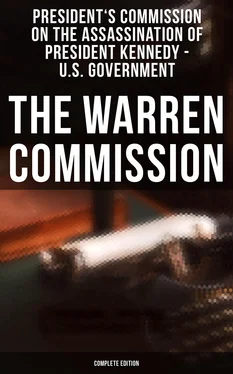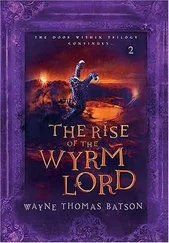Am I giving sufficient answers to your questions?
Mr. Rankin. You are doing fine.
Did your consideration of a divorce from your husband have anything to do with his ideas and political opinions?
Mrs. Oswald. No. The only reasons were personal ones with reference to our personal relationship, not political reasons.
Mr. Rankin. In your story you say that what was involved was some of his crazy ideas and political opinions. Can you tell us what you meant by that?
Mrs. Oswald. This was after the case, after the matter of the divorce. I knew that Lee had such political leanings.
Mr. Rankin. With regard to your Russian friends, did you find the time when they came less to see you and didn't show as much interest in you?
Mrs. Oswald. Yes.
Mr. Rankin. Can you give us about the time, just approximately when you noticed that difference?
Mrs. Oswald. Soon after arriving in Dallas. Mostly it was De Mohrenschildt who visited us. He was the only one who remained our friend. The others sort of removed themselves.
Mr. Rankin. Do you know why that was?
Mrs. Oswald. Because they saw that Lee's attitude towards them was not very proper, he was not very hospitable, and he was not glad to see them. They felt that he did not like them.
Mr. Rankin. Will you describe what you observed that caused you to think this, or how your husband acted in regard to these friends?
Mrs. Oswald. He told me that he did not like them, that he did not want them to come to visit.
Mr. Rankin. Did he show any signs of that attitude towards them?
Mrs. Oswald. Yes, he was not very talkative when they came for a visit. Sometimes he would even quarrel with them.
Mr. Rankin. When he quarreled with them, was it in regard to political ideas or what subjects?
Mrs. Oswald. Yes, they would not agree with him when he talked on political matters.
Mr. Rankin. Do you recall any conversation that you can describe to us?
Mrs. Oswald. Of course it is difficult to remember all the conversations. But I know that they had a difference of opinion with reference to political matters. My Russian friends did not approve of everything. I am trying to formulate it more exactly. They did not like the fact that he was an American who had gone to Russia. I think that is all. All that I can remember.
Mr. Rankin. What did they say about——
Mrs. Oswald. Excuse me. Simply I would be busy, and I didn't listen to the conversation.
Mr. Rankin. Can you recall anything else about the conversation or the substance of it?
Mrs. Oswald. No.
Mr. Rankin. When did you first consider the possibility of returning to the Soviet Union?
Mrs. Oswald. I never considered that, but I was forced to because Lee insisted on it.
Mr. Rankin. When you considered it, as you were forced to, by his insistence, do you know when it was with reference to your first request to the Embassy, which was February 17, 1963?
Mrs. Oswald. February 17?
Mr. Rankin. Yes.
Mrs. Oswald. I think it was a couple of weeks before that, at the beginning of February.
Mr. Rankin. Did your husband know about the letter you sent to the Embassy on February 17?
Mrs. Oswald. Of course. He handed me the paper, a pencil, and said, "Write."
Mr. Rankin. Did he tell you what to put in the letter, or was that your own drafting?
Mrs. Oswald. No, I knew myself what I had to write, and these were my words. What could I do if my husband didn't want to live with me? At least that is what I thought.
Mr. Rankin. Did you ever have arguments with your husband about smoking and drinking wine, other things like that?
Mrs. Oswald. About drinking wine, no. But he didn't like the fact that I smoked, because he neither smoked nor drank. It would have been better if he had smoked and drank.
Mr. Rankin. Can you tell us approximately when you first met Ruth Paine?
Mrs. Oswald. Soon after New Years—I think it was in January.
Mr. Rankin. Would that be 1963?
Mrs. Oswald. Yes.
Mr. Rankin. Can you describe the circumstances when you met her?
Mrs. Oswald. We were invited, together with George De Mohrenschildt and his wife, to the home of his friend, an American. And Ruth was acquainted with that American. She was also visiting there. And there were a number of other people there, Americans.
Mr. Rankin. Who was this friend? Do you recall?
Mrs. Oswald. I don't remember his last name. If you would suggest, perhaps I could say.
Mr. Rankin. Was that Mr. Glover?
Mrs. Oswald. What is his first name?
Mr. Rankin. Everett.
Mrs. Oswald. Yes. I don't know his last name.
Mr. Rankin. Did you talk to Mrs. Paine in Russian at that time?
Mrs. Oswald. A little, yes.
Mr. Rankin. Did Mrs. Paine ever visit you at Elsbeth Street?
Mrs. Oswald. At Neely, on Neely Street.
Mr. Rankin. But not at Elsbeth?
Mrs. Oswald. We moved soon after that acquaintance.
Mr. Rankin. How did your husband treat June? Was he a good father?
Mrs. Oswald. Oh, yes, very good.
Mr. Rankin. Did you notice any difference in his attitude towards your child after you saw this change in his personality?
Mrs. Oswald. No.
Mr. Rankin. Will you describe to the Commission how your husband treated the baby, and some of his acts, what he did?
Mrs. Oswald. He would walk with June, play with her, feed her, change diapers, take photographs—everything that fathers generally do.
Mr. Rankin. He showed considerable affection for her at all times, did he?
Mrs. Oswald. Yes. If I would punish June, he would punish me.
Mr. Rankin. When did you first meet Michael Paine?
Mrs. Oswald. After I became acquainted with Ruth and she visited me for the first time, she asked me to come for a visit to her. This was on a Friday. Her husband, Michael, came for us and drove us to their home in Irving.
Mr. Rankin. They were living together at that time, were they?
Mrs. Oswald. No.
Mr. Rankin. Did Michael Paine know Russian?
Mrs. Oswald. No.
Mr. Rankin. At the time of the Walker incident, do you recall whether your husband had his job or had lost it?
Mrs. Oswald. You had said that this had happened on a Wednesday, and it seems to me that it was on a Friday that he was told that he was discharged. He didn't tell me about it until Monday.
Mr. Rankin. But it was on the preceding Friday that he was discharged, was it not?
Mrs. Oswald. No, not the preceding Friday—the Friday after the incident. That is what he told me.
Mr. Rankin. If he had lost his job before the Walker incident, you didn't know it then?
Mrs. Oswald. No.
Mr. Rankin. On the day of the Walker shooting did he appear to go to work as usual?
Mrs. Oswald. Yes.
Mr. Rankin. And when did he return that day, do you recall?
Mrs. Oswald. Late at night, about 11.
Mr. Rankin. He did not come home for dinner then, before?
Mrs. Oswald. Yes, he had come home, and then left again.
Mr. Rankin. Did you notice any difference in his actions when he returned home and had dinner?
Mrs. Oswald. No.
Mr. Rankin. Did he appear to be excited, nervous?
Mrs. Oswald. No, he was quite calm. But it seemed to me that inside he was tense.
Mr. Rankin. How could you tell that?
Mrs. Oswald. I could tell by his face. I knew Lee. Sometimes when some thing would happen he wouldn't tell me about it, but I could see it in his eyes, that something had happened.
Mr. Rankin. And you saw it this day, did you?
Mrs. Oswald. Yes.
Mr. Rankin. When did he leave the home after dinner?
Mrs. Oswald. I think it was about 7. Perhaps 7:30.
Mr. Rankin. Did you observe whether he took any gun with him?
Mrs. Oswald. No. He went downstairs. We lived on the second floor. He said, "Bye-bye."
Читать дальше












